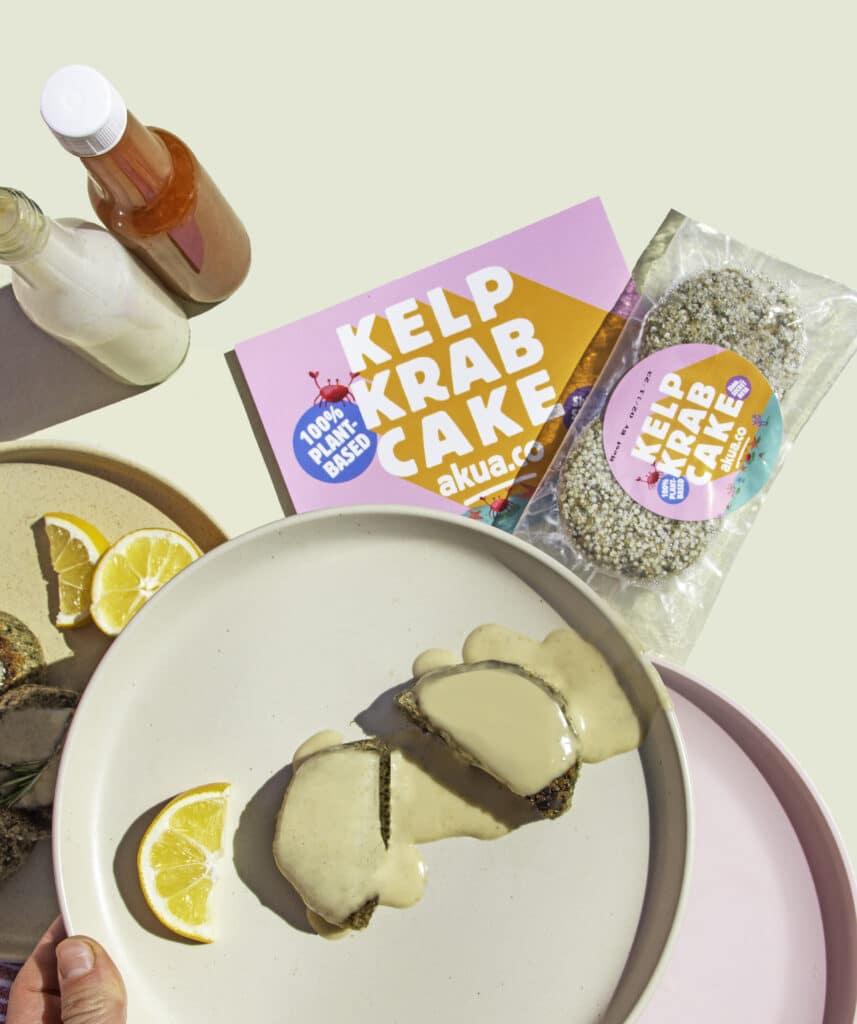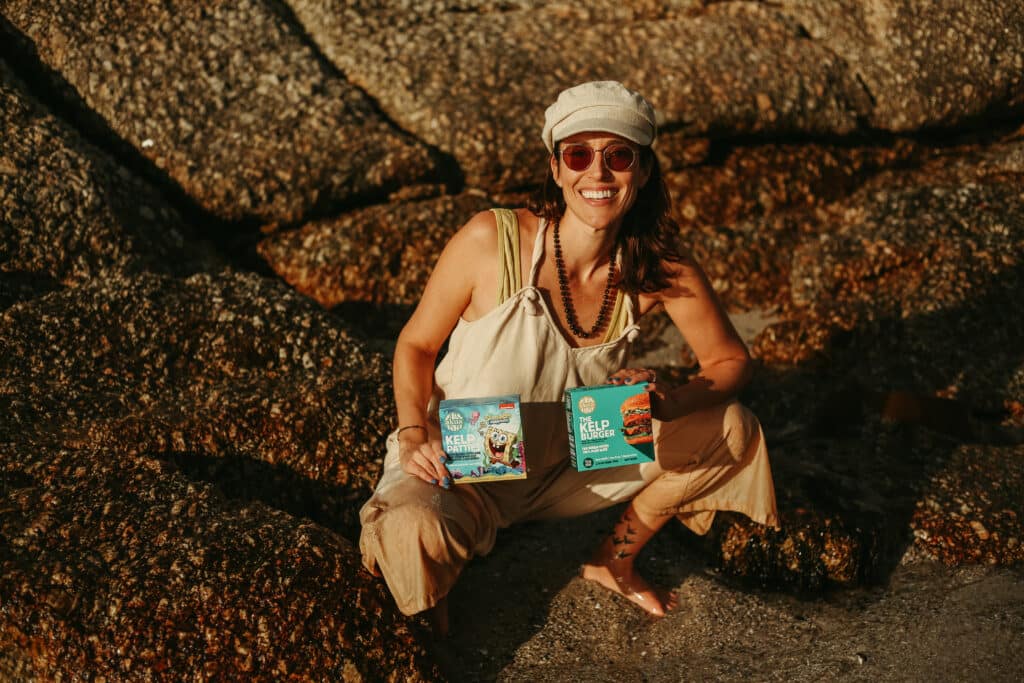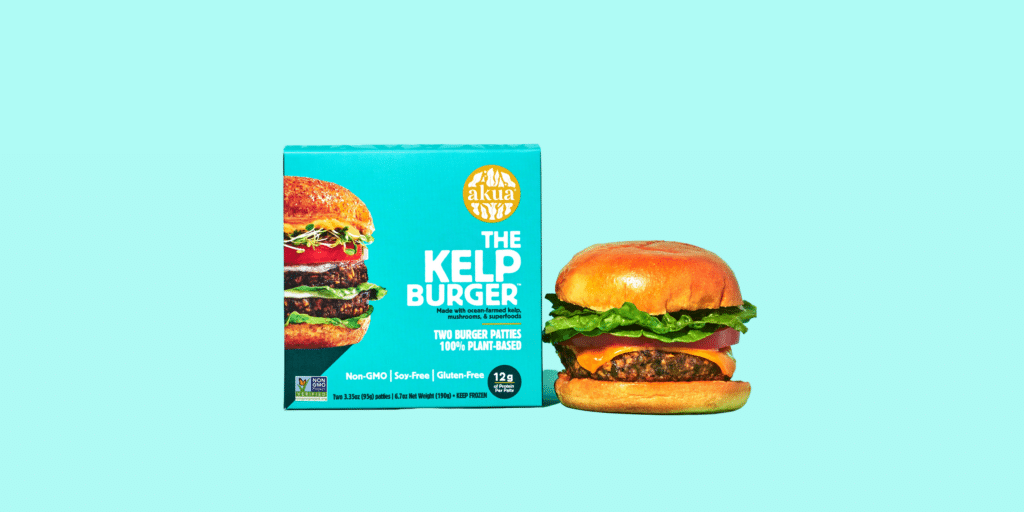There are all sorts of meatless burgers out there, from bean and soy to those trying to look and taste like beef, but have you ever tried a Kelp Burger? If not, you’re missing out on a flavorful, nuanced, sustainable eating experience.
Kelps are large brown seaweeds or algae that grow in underwater forests. There are 30 different types, and they are all extremely beneficial for the environment.
Kelp absorbs carbon dioxide from seawater to the tune of nearly five million tons each year, according to New Scientist, which helps reduce ocean acidification, as well as sequesters phosphorus and nitrogen. Kelp also provides habitat for fish and other marine life.
Kelp isn’t just good for the ocean and the atmosphere, it’s good for you — tasty and packed with vitamins, minerals and antioxidants.
In 2021, AKUA, a kelp-based food company co-founded by CEO Courtney Boyd Myers, released the world’s first Kelp Burger, which comes in a variety of flavors, all non-GMO and made from regenerative ocean-farmed kelp, tomatoes and mushrooms, including the Original, the Chili Sesame Kelp Burger and the Lemon and Herb Kelp Burger. They also recently released two SpongeBob-approved Kelp Patties in Original and BBQ flavors. You can cook these scrumptious, sustainable patties on the stove or outdoor grill for that quintessential summer barbeque experience.

All varieties of the Kelp Burger are tasty and like nothing you’ve ever had in a plant-based food.
“We’re building a company that, for the days you wanna have something super fast, healthy, delicious and sustainable, AKUA’s your go to,” Myers told EcoWatch.
During the pandemic, Myers said AKUA had more than 1,000 people help develop the Kelp Burger through taste tests, and the consensus was that Kelp Burgers not only taste uniquely delicious but are hearty, filling and the perfect meal for a backyard barbeque, a picnic, an easy and quick lunch or anything in between.
In addition to its range of Kelp Burgers and its plant-based ground meat, AKUA makes kelp-based Krab Cakes, which have a wonderful flavor that Olivia Rosane, long-time EcoWatch contributor and Opinion Editor of nonprofit news website Common Dreams, called “Zesty.”

“It does taste like seafood, even though I know there’s no meat. I would have thought it was a crab cake with quinoa mixed in,” Rosane told EcoWatch. “It has a mushroom note, like when you have truffle oil.”
Of the SpongeBob BBQ Kelp Patty, English musician Tom Evans, a long-time consumer of beef burgers, said, “Mmm, delicious!” adding that he would have thought it was made with meat if no one had said otherwise.
Kelp Burgers may be able to pass for traditional beef burgers, but taste, not emulation, is AKUA’s top priority.
“We think a lot about how to get more people to eat plant-based and to care about eating plant-based. We believe it’s simple: our goal is to make a truly delicious, nourishing product – something much better than a soy burger or bean patty, something that’s really satiating. And then, on the flip side, we haven’t chosen the Beyond and Impossible route, e.g., ‘This tastes just like a beef burger, and that’s why you should eat it,’ because, unfortunately, the ‘fake meat’ products are just not healthy for you,” Myers told EcoWatch.
Of the Krab Cakes, Evans said, “They’re quite filling. It’s got a very comforting, homey taste. It’s something you would look forward to as a treat — a fulfilling meal after working the night shift.”
So, how did the world’s first Kelp Burger come to be?

“Like most teenage girls, I was thinking a lot about health and wellness, and my body. At age 16, I remember eating burgers with friends on Memorial Day and for some reason I just didn’t want to eat one because I felt like I was kinda eating my own flesh,” Myers said. “Personally, I’ve always had a natural aversion to eating animal meat. But I understand it’s not the same for all people reading this article. This is part of the reason why our brand is not ‘go vegan or go home’. I believe people need to eat what makes them feel good.”
Myers said she was inspired to start AKUA because of how food choices had affected her father’s health.
“A lot of people who start healthy food companies do so because of personal health journeys, and for me, this story started with my Dad. He was in the food industry, he worked at Pepsi and Burger King and I watched him get two heart attacks, diabetes and two types of cancer. These are Western diseases, and they are the result of eating a typical Western Diet,” Myers said.
“I have a bit of a chip on my shoulder towards big food. They have a lot to answer for, both in terms of impacting human health by selling ultra-processed food, and for the vast amount of environmental damage caused. In many ways, the burger is a symbol of everything that is wrong with the American food system, but it’s also of course a symbol of joy around American holidays and comfort food,” Myers added. “So what if we could create a burger that represented everything that could be right with the food system – a healthy, delicious burger made from locally sourced, regenerative aquaculture so you can get all the pleasure of a burger and feel good about eating it too.”

Myers had an affinity for seaweed long before starting AKUA in 2019.
“I was eating seaweed all the time, well before I knew about the environmental benefits. I just love it. I’m that person who orders two seaweed salads at a restaurant because I don’t want you to eat mine!” Myers told EcoWatch. “When I was thinking about sustainability as a career, my friend invited me to a kelp farm with the GreenWave team, an incredible nonprofit that teaches fishermen how to kelp farm. I met with GreenWave’s founder Bren Smith on a kelp farm boat and he told me his plans for scaling the kelp industry. And I thought, ‘Well, if you’re going to grow it, I’ll help figure out a way to get people to eat it!’”

How does a kelp-based food company get the public on board with eating kelp, even if they may not be strictly vegetarian?
“First, we have to explain what kelp is. My favorite line is that kelp is a seaweed but not all seaweeds are kelp. Another element that resonates with people is to talk about how we’re not getting lots of vitamins and minerals from our soil anymore because of soil depletion, but we can still get a lot of vitamins and minerals from really clean areas of the ocean,” Myers said. “One of our biggest customer bases are boomers who buy our products because their doctors are telling them to eat more seafood. So we also do a lot of positioning to include kelp in the seafood conversation. And for the millennial moms and Gen Z kids, we’ve got SpongeBob SquarePants! We also do a fair bit of work with celebrities and influencers to help us spread the word!”
Myers said about 50% of Kelp Burger consumers are vegetarian, which of course means the other half eat meat.
Another reason to eat Kelp Burgers is that they’re carbon-negative. Through the process of photosynthesis, kelp removes carbon and turns it into oxygen for animals and humans to breathe.
According to the AKUA website, one year of eating beef burgers results in a 660-ton carbon footprint, while a year of munching on Kelp Burgers yields the removal of 300 tons of carbon.
“We look at impact in two ways. One is the actual CO2 that the kelp is pulling out of the ocean. Two is carbon avoidance, so for every Kelp Burger you eat instead of a beef burger, you’re avoiding that much CO2 that would have been created,” Myers told EcoWatch.
AKUA has a specific target audience in mind, but, as our taste test shows, Kelp Burgers are for everyone.

“We target women in the majority of our marketing,” Myers said. “The product was created by a busy millennial for busy millennials, and now, with SpongeBob, it’s created by a busy millennial mom for busy millennial moms to cook up fast, healthy food for their kids.”
Kelp Burger products are available for order on the AKUA website and in stores and restaurants across the United States.
"tasty" - Google News
August 04, 2023 at 10:24PM
https://ift.tt/OQH7UbP
Tasty, Carbon-Negative Kelp Burgers Are ‘Everything That’s Right ... - EcoWatch
"tasty" - Google News
https://ift.tt/SOYv9MK
https://ift.tt/3WAP5Dh
Bagikan Berita Ini














0 Response to "Tasty, Carbon-Negative Kelp Burgers Are ‘Everything That’s Right ... - EcoWatch"
Post a Comment